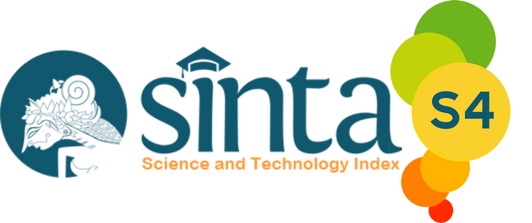FAKTOR-FAKTOR YANG MEMPENGARUHI RESPON PETANI TERHADAP TEKNOLOGI BUDIDAYA BAWANG MERAH RAMAH LINGKUNGAN DI KABUPATEN TEGAL
Abstract
Environmentally friendly onion cultivation technology in the onion development area in Central Java is one of the innovations to produce safe products and good quality seeds so that it will have a high competitiveness in the face of free markets such as the ASEAN Economic Community (MEA). However, this innovation to be implemented by all shallot farmers should be disseminated with the aim of accelerating the transfer of technological innovation to users (farmers, extension officer, and rural communities). The purpose of this research is: (a) to know the farmer's response about environmentally friendly onion cultivation technology and (b) to know determinant the factors of the farmer's response to the cultivation of environmentally friendly onion cultivation technology. Bottom of Form This research was conducted in 2016, in Tegal district, Central Java province with a sample of onion farmers. The analytic description method has been used in this research as the basic method, while the sampling method is purposive sampling on 40 onion farmers from 4 (four) sub districts of Kramat, Dukuh Turi, Bojong, and Margasari. Several data analyzes in this study include: proportion test for hypothesis 1 and multiple linear regression analysis for hypothesis 2. In this study the final results used proportional analysis proved that many onion farmers (> 50%) in Tegal district have good response about the activities of environmentally friendly onion cultivation technology. Multiple linear regression analysis showed that farming time and farmer age significantly influenced farmer's response about environmentally friendly green onion cultivation technology, while education level significantly did not significantly (α = 0,05).
Keywords
Full Text:
PDFReferences
Anggoro, N. 2004. Respon Petani Terhadap Program Konservasi Tanah di Kabupaten Klaten. Fakultas Pertanian Universitas Gadjah Mada.
Dinas Pertanian Tanaman Pangan dan Hortikultura, 2007 . Pedo- man Standar Minimal BPP Model di Sumatra Barat. Sumatra Barat
Irawan, 2013. Pertanian Ramah Lingkungan : Indikator dan Cara Pengukuran Aspek-Eknomi. Prosiding Seminar Nasional Pertanian Ramah Lingkungan. Badan Penelitian dan Pengem- bangan Pertanian. Jakarta
Mardikanto, T. 2010. Metoda Pene- litian dan Evaluasi Pember- dayaan Masyarakat. Program Studi Penyuluhan Pembangu- nan/Pemberdayaan Masyara- kat Program Pascasarjana UNS. Surakarta.
Pangestuti Retno, Samijan, Tri Cahyo Mardiyanto, Retno Endrasari, Eman Supratman. 2016. Lapo- ran Kegiatan Pendampingan dan Pengembangan Kawasan Hortikultura Komoditas Ba- wang Merah di Jawa Tengah. BPTP Jawa Tengah, Badan Penelitian dan Pengembangan Pertanian, Kementerian Perta- nian.
Pasaribu, S. M., K. Suradisasttra, B. Sayaka dan A. Dariah. 2010. Pengendalian dan Pemulihan Degradasi Ekosistem Pertanian. Badan Penelitian dan Pengem- bangan Pertanian. Kementerian Pertanian.
Rusmialdi, R. 1997. Tanggapan Petani Terhadap Iuran P3A di Kabu- paten Lampung Tengah, Pro- pinsi Lampung (Antisipasi Terhadap Pengembangan P3A Mandiri). Jurnal Sosial Ekono- mika. Universitas Lampung. Bandar Lampung.
Suryabrata, Sumadi. 2004. Meto- dologi Penelitian. PT. Raja Grafindo Persada. Jakarta.
Wirawan, Sarlito. 2005. Teori-teori Psikologi Sosial. Rajawali Pers. Jakarta
Refbacks
- There are currently no refbacks.






